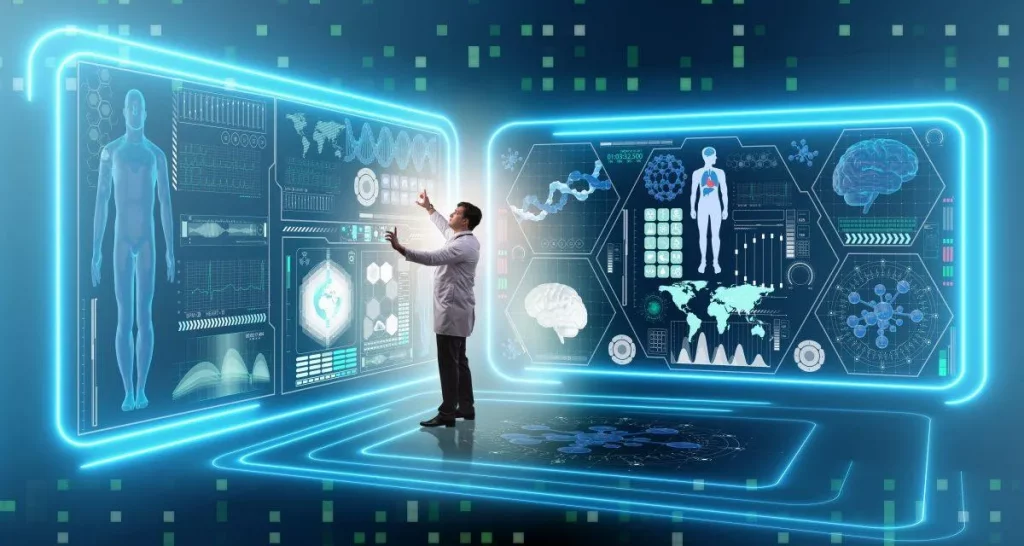Introduction
Artificial Intelligence is rapidly transforming healthcare—not just in research labs, but in clinics, hospitals, and homes. AI is helping improve patient outcomes, streamline clinical workflows, reduce costs, and support population health management.
Revolutionizing Preventive Care & Risk Detection
- Advanced screening tools: AI is powering diagnostic imaging systems that can detect early signs of cancer, heart disease, and kidney conditions—often before symptoms appear.
- Predictive analytics: AI algorithms can now interpret ECGs to detect hidden signs of arrhythmias like atrial fibrillation, potentially identifying patients at risk for stroke, dementia, or other serious conditions.
Enhancing Clinical Workflow & Supporting Doctors
- AI medical scribes: These tools transcribe and summarize doctor–patient conversations in real time, reducing administrative burden and allowing clinicians to focus more on care.
- Decision support systems: AI-powered platforms assist healthcare providers by analyzing large datasets and offering diagnostic suggestions, treatment options, and alerts for high-risk conditions.
Opening New Frontiers in Research and Innovation
- Smarter clinical trials: AI is streamlining trial design and patient selection, leading to faster, more targeted studies. Algorithms are also helping identify disease earlier through pattern recognition in imaging and genomics.
- Translational applications: AI research is increasingly embedded into clinical settings, enabling faster translation of innovations into everyday patient care.
Remote Monitoring & Patient-Centric Virtual Care
- Wearables and sensors: AI-enhanced devices monitor patients’ vital signs in real time, detect anomalies, and alert clinicians when intervention is needed.
- Virtual health assistants: Conversational AI tools check in with patients, answer basic questions, and guide care between appointments—improving engagement and reducing unnecessary hospital visits.
Creating Smarter Care Environments: The Rise of “Smart Hospitals”
- Next-gen infrastructure: Smart hospitals use AI, Internet of Things (IoT), robotics, and real-time dashboards to optimize workflows, improve patient tracking, and enhance clinical decision-making.
- Operational efficiency: From voice-activated nurse stations to predictive staffing algorithms, AI is making hospitals safer, faster, and more responsive to patient needs
Equity, Ethics & Responsible AI Adoption
- Bias and fairness: One major challenge is ensuring AI models don’t perpetuate existing health disparities. Fairness testing and diverse data sourcing are key to creating inclusive systems.
- Transparency and governance: Responsible AI implementation requires clear oversight, explainable algorithms, and collaboration between clinicians, technologists, and ethicists
Real-World Impact: Better Outcomes, Lower Costs, Happier Populations
- Early detection combined with AI-informed care plans allows for quicker interventions and improved patient outcomes.
- Automation of repetitive tasks like documentation and data analysis reduces clinician burnout and cuts costs.
- Community health improves when AI tools are used in public health campaigns, screening initiatives, and chronic disease management.
Conclusion
AI is more than a buzzword—it’s a foundational shift in how we deliver, manage, and experience healthcare. By making care more personalized, proactive, and efficient, AI has the potential to uplift entire health systems. While challenges like privacy, bias, and adoption costs remain, the future of AI-driven healthcare is already unfolding—and it’s full of promise.
About the author: Zahid Rashid is the CEO of Optimyzn which specializes in Salesforce, Analytics, AI/Automation and Contract CLM implementation and managed services

